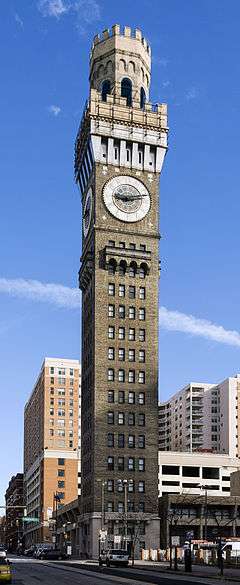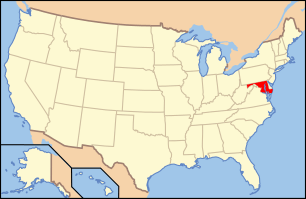Emerson Bromo-Seltzer Tower
| Bromo Seltzer Arts Tower | |
|---|---|
 | |
| Former names |
Bromo-Seltzer Tower Baltimore Arts Tower |
| General information | |
| Type | Commercial offices |
| Architectural style | Renaissance Revival |
| Location |
312 West Lombard Street Baltimore, Maryland |
| Coordinates | 39°17′15″N 76°37′15″W / 39.2875°N 76.620833°WCoordinates: 39°17′15″N 76°37′15″W / 39.2875°N 76.620833°W |
| Construction started | 1907 |
| Completed | 1911 |
| Management | Baltimore Office of Promotion & The Arts |
| Height | |
| Roof | 88 m (289 ft) |
| Technical details | |
| Floor count | 15 |
| Design and construction | |
| Architect |
Joseph Evans Sperry |
|
Emerson Bromo-Seltzer Tower | |
 | |
| Area | 0.1 acres (0.040 ha) |
| Built | 1911 |
| Architect | Joseph Evans Sperry |
| Architectural style | Romanesque |
| NRHP Reference # | 73002184[1][2] |
| Added to NRHP | June 4, 1973 |
| References | |
| [3][4][5] | |
Emerson Tower often referenced as Emerson Bromo-Seltzer Tower is a 15-story, 88 m (289 ft) skyscraper erected in 1911 at the corner of Eutaw and Lombard Streets in Baltimore, Maryland, designed by Joseph Evans Sperry for Bromo-Seltzer inventor "Captain" Isaac E. Emerson.[6][7]
History
It was the tallest building in Baltimore from 1911 until 1923.[8] The design of the tower along with the original factory building at its base was inspired by the Palazzo Vecchio in Florence, Italy, which was seen by Emerson during a tour of Europe in 1900.[9] Systems engineering for the building's original design was completed by Henry Adams. The factory was demolished in 1969 and replaced with a firehouse.[8]
The building features four clock faces adorning the tower's 15th floor on the North, South, East and West sides. Installed by the Seth Thomas Clock Company at an original cost of US$3,965, they are made of translucent white glass and feature the letters B-R-O-M-O S-E-L-T-Z-E-R, with the Roman numerals being less prominent. The dials, which are illuminated at night with mercury-vapor lamps, are 24 feet (7.3 meters) in diameter, and the minute and hour hands approximately 12 and 10 feet (3.7 and 3.0 meters) in length respectively. Upon its completion, the Bromo Seltzer Tower featured the largest four dial gravity driven clock in the world. Originally driven by weights, the moving parts are now electrically powered.[8] The word BROMO reads clockwise, and SELTZER counterclockwise, which results in the letters being located in the following positions:
- B-10
- R-11
- O-12
- M-1
- O-2
- S-9
- E-8
- L-7
- T-6
- Z-5
- E-4
- R-3
The tower originally had a 51 ft (16 m) Bromo-Seltzer bottle,[10][11] glowing blue and rotating. Weighing 20 tons (18.1 tonnes), it was lined with 314 incandescent light bulbs and topped with a crown on a clear night it could be seen from 20 miles away.[8][12] The bottle was removed in 1936 because of structural concerns.
The tower was virtually abandoned in 2002, but in early 2007 the Baltimore Office of Promotion and the Arts and philanthropists Eddie and Sylvia Brown worked to transform the structure into artist studios. The Bromo Seltzer Arts Tower is now home to a variety of creative artists, writers, videographers, photographers, poets, and more. Throughout the day, artists welcome guests into their studios to view and purchase original art. The Baltimore Fire Department's John F. Steadman Fire Station, which opened in 1973 and is situated at the tower's base, houses BCFD Hazmat 1, Airflex 1, Medic1, Medic 23, MAC23, Engine 23, Rescue 1, and formerly Truck 2.[11][13]
The Emerson Bromo-Seltzer Tower was placed on the National Register of Historic Places in 1973.[1] It is included within the Baltimore National Heritage Area.[14]
Visiting the Bromo Seltzer Arts Tower
Clock Room Tours are on Saturdays at 11:30, 12:30, 1:30, and 2:30 for a $5 fee.
Private tours may be set up with reservations.
Free art openings occur approximately every 2 months.
Sounds of the Tower Open Mike occurs on Saturday afternoons starting at 1:00.
See also
References
- 1 2 National Park Service (2010-07-09). "National Register Information System". National Register of Historic Places. National Park Service.
- ↑ "National Register of Historical Places - Maryland (MD), Essex County". National Register of Historic Places. National Park Service. 2007-02-07. Retrieved 8 April 2012.
- ↑ Emerson Bromo-Seltzer Tower at Emporis
- ↑ "Emerson Bromo-Seltzer Tower". SkyscraperPage.
- ↑ Emerson Bromo-Seltzer Tower at Structurae
- ↑ Baltimore: A National Register of Historic Places Travel Itinerary
- ↑ C. Black and A. McClellan (August 1972). "National Register of Historic Places Registration: Emerson Bromo-Seltzer Tower" (PDF). Maryland Historical Trust. Retrieved 2016-03-01.
- 1 2 3 4 Kelly, Jacques. "Bromo Seltzer Tower celebrates 100 years," The Baltimore Sun, Friday, June 3, 2011.
- ↑ Dorsey, John & Dilts, James D., A Guide to Baltimore Architecture (1997) p. 172. Tidewater Publishers, Centreville, Maryland ISBN 0-87033-477-8
- ↑ "Historic Emerson Bromo-Seltzer Clock Tower in Baltimore". spearsvotta.com. Retrieved 2008-06-26.
- 1 2 "Bromo Seltzer Arts Tower". bromoseltzertower.com. Retrieved 2008-06-26.
- ↑ http://knowingpoe.thinkport.org/person/poesbalto_popup_bromo.asp
- ↑ Frederick N. Rasmussen (October 2, 2004). Rasmussen "John Steadman, `Fireman's Fireman'" Check
|url=value (help). The Baltimore Sun. Retrieved 9 April 2012. - ↑ "Baltimore National Heritage Area Map" (PDF). City of Baltimore. Retrieved March 11, 2012.
External links
| Wikimedia Commons has media related to Emerson Bromo-Seltzer Tower. |
- Emerson Bromo-Seltzer Tower, Baltimore City, including undated photo, at Maryland Historical Trust
- Bromo Seltzer Arts Tower
- Baltimore, Maryland, a National Park Service Discover Our Shared Heritage Travel Itinerary
- Bromo Seltzer Tower on Google Street View
- Explore Baltimore Heritage - Bromo Seltzer Tower

